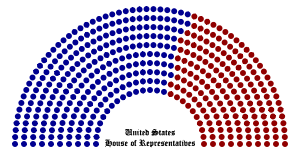
- Image via Wikipedia
By Greg Masters
The U.S. House of Representatives has passed a defense bill that contains an amendment aimed at regulating the information security responsibilities and practices of federal agencies.
The amendment, sponsored by Rep. Jim Langevin, D-R.I., and Rep. Diane Watson, D-Calif., updates the Federal Information Security Management Act (FISMA) and establishes a National Office for Cyberspace in the Executive Office of the President.
The amendment was attached to the National Defense Authorization Act for Fiscal Year 2011, which passed the House Friday by a 229-186 vote.
“The passage of this amendment comes after a great deal of work to raise awareness about the cybervulnerabilities that exist throughout our federal government,” Langevin, co-chair of the House Cybersecurity Caucus, said in a news release. “These provisions will establish strong, centralized oversight to protect our nation’s critical information infrastructure and update our comprehensive policy for operating in cyberspace.”
The measure integrates a number of policy recommendations made by the Obama administration’s 60-day Cyberspace Policy Review, the CSIS Commission on Cybersecurity for the 44th Presidency and the U.S. Government Accountability Office (GAO), which has offered suggestions for remedying security vulnerabilities across federal agencies.
The amendment establishes the National Office for Cyberspace (NOC) within the Executive Office of the President.
A director, appointed by the president and confirmed by the Senate, would be charged with coordinating and overseeing the security of agency information systems and infrastructure. In addition, a CTO would be hired.
Also, a Federal Cybersecurity Practice Board within the NOC would be charged with overseeing the implementation of NIST-approved standards and guidelines, in addition to defining policies that agencies must adhere to in order to comply with FISMA requirements.
Further, agencies would be required to undertake automated and continuous monitoring of their systems to ensure compliance and to identify potential risks to assets. An annual independent audit of information security programs to determine their overall effectiveness and compliance with FISMA requirements would also be required.
The amendment also calls for developing policies to be used in the purchasing of technology products and services.
A version of the bill currently making its way through the Senate does not contain the Watson-Langevin amendment, but it could be altered before it is voted on by the upper chamber. Adjustments between the two versions of the bill could be made in conference before it is presented for President Obama’s signature. The Senate version passed the Armed Services Committee
The amendment combines two previous bills: Watson’s Federal Information Security Amendments Act and Langevin’s Executive Cyberspace Authorities Act.
Related articles by Zemanta
- FISMA Reform Inches Forward (blogs.splunk.com)
- Slippery Slope Alert: “National Office for Cyberspace” Proposed (pff.org)
- Telos Provides Cybersecurity Expertise For Administration Web Initiative (eon.businesswire.com)
- Panel Backs Measure To Boost Federal Cybersecurity (techdailydose.nationaljournal.com)
- Federal Cybersecurity Monitoring Goes Real Time (techdailydose.nationaljournal.com)
- Telos Awarded Blanket Purchase Agreement with Office of Governmentwide Policy (eon.businesswire.com)




